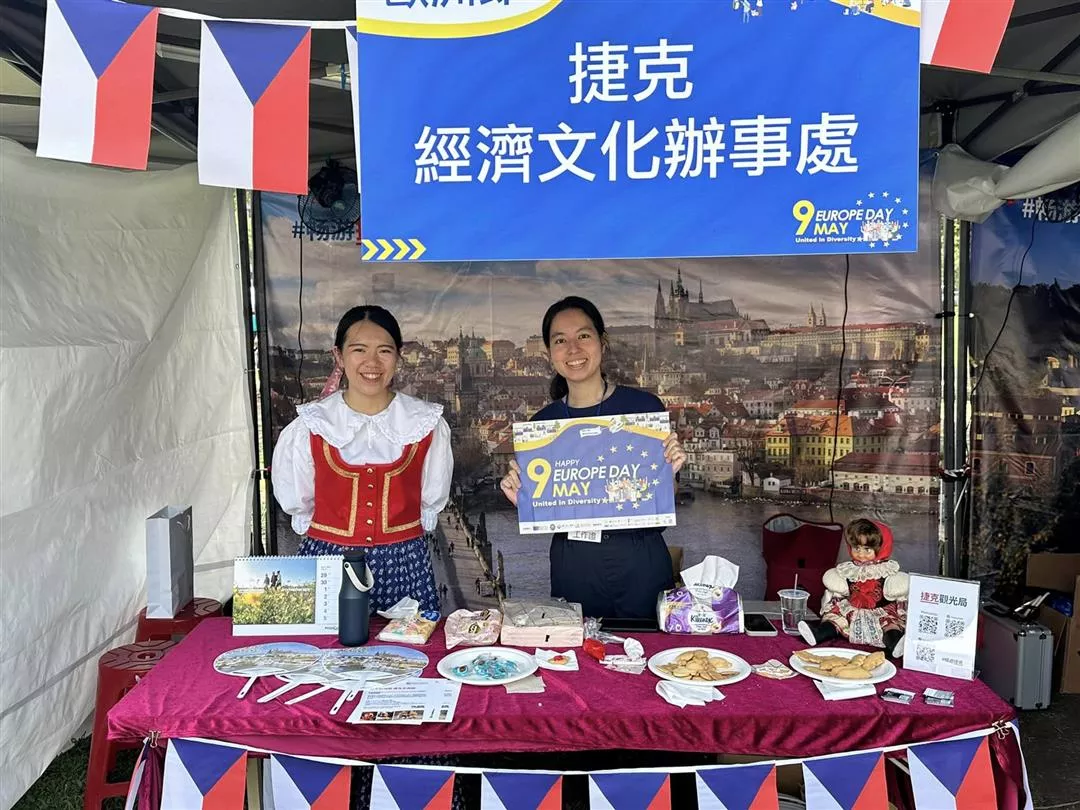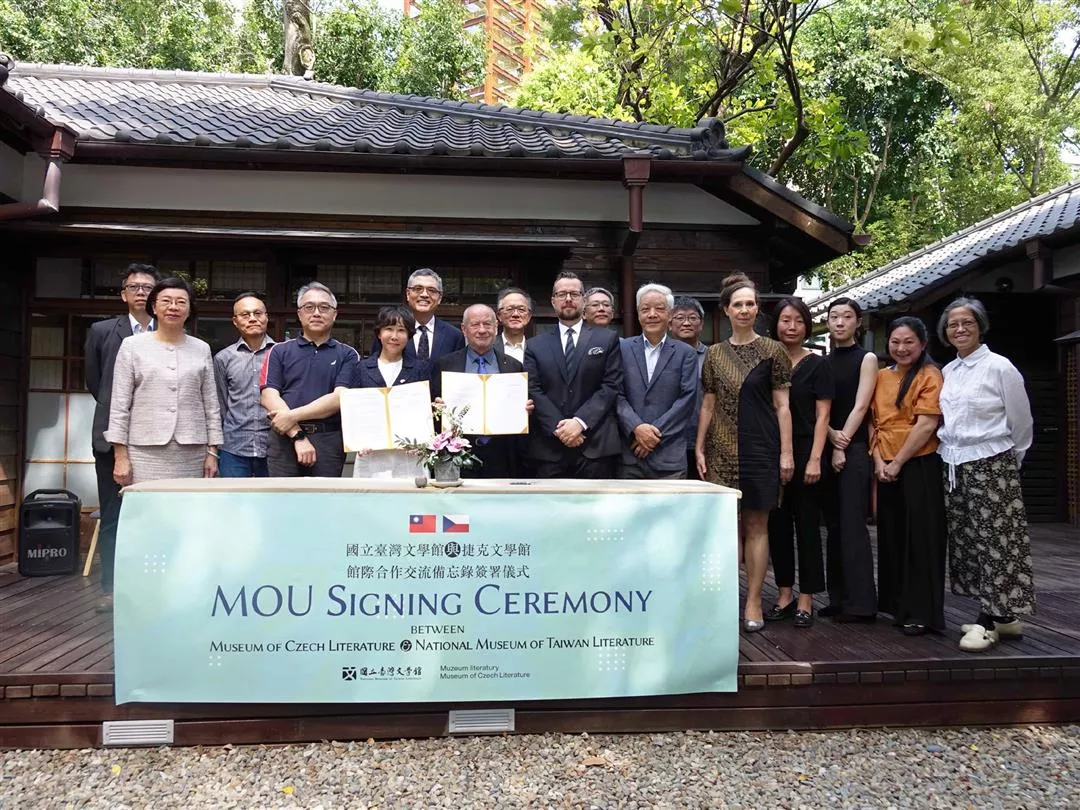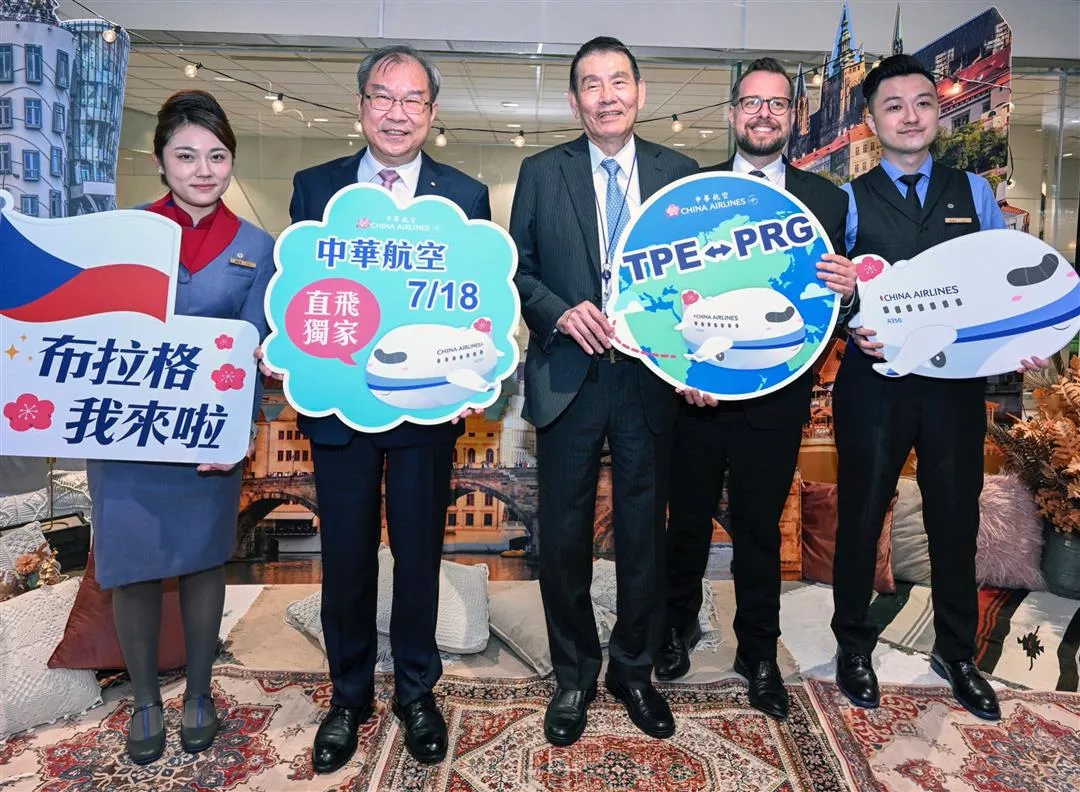A New Chapter in Taiwan–Czechia Relations
An Interview with David Steinke, Czech Representative to Taiwan
Lynn Su / photos by Jimmy Lin / tr. by Phil Newell
July 2024

Based on the sister city relationship between Taipei City and Prague, the Taipei Zoo presented the Prague Zoo with a pair of pangolins, and in 2023 they gave birth to a baby pangolin, marking the first ever successful case of pangolin breeding in Europe.
This extraordinary event is a positive omen to David Steinke, representative at the Czech Economic and Cultural Office in Taipei. It also represents the friendship between Taiwan and the Czech Republic, which has been developing for nearly 30 years and is bearing fruit in many areas.
Unlike many Czechs, who are outwardly reserved and keep their emotions inside, David Steinke is overtly enthusiastic and upbeat. He studied at Catholic University in Leuven, Belgium, has been posted to New York, London, and Paris, and has lived in various countries. He relates that his first trip to Asia was in 2015, when he came to Taiwan.
A blend of traditional and modern
Though kept busy by his official duties, Steinke takes every available opportunity to engage in cultural observation.
This foreigner enjoys many common foods in Taiwan such as danbing (egg pancakes) and xiaolongbao (soup dumplings), and even openly praises tea eggs in a YouTube video: “The flavor is simple but delicious—this is one of Taiwan’s greatest inventions.” He also likes tropical fruits such as mangoes, pineapples, and passion fruit, and has even more extravagant praise for Taiwan’s many hot springs.
Nonetheless, in Steinke’s eyes, the most unique thing about Taiwan is the co-existence of the modern and the traditional, of high technology with folk culture. “This is something I haven’t experienced in Paris, London, or New York.”
He mentions the example of the Taiwan High Speed Rail. He often takes the THSR to travel to various places in Taiwan, and may end up visiting a world-leading advanced semiconductor factory in the morning, and then by contrast strolling in the evening through a crowded night market filled with the vitality characteristic of Taiwan’s people.
With his own pragmatic personality, he was surprised by the important role that traditional culture and religious beliefs play in the daily lives of Taiwanese. He notes that Taiwanese people not only place great importance on the rituals of traditional holidays and festivals, but if they encounter setbacks or confusion in the course of everyday life they are in the habit of going to a temple to ask the deities for advice or to seek solace. In addition, family relationships in Taiwan are typically very close. These characteristics have made a deep impression on him.

Steinke, who is outgoing and humorous, has had a series of heartwarming encounters in Taiwan.

David Steinke, representative of the Czech Republic (Czechia) in Taiwan, has a strong sense of aesthetics; after coming to Taiwan he visited the Jianguo Flower Market to buy some plants for his new digs.
Living in an arts capital
While many Westerners are very fond of Taiwan’s high mountains, Steinke remarks: “I have to tell you this, I am not a hiker.” Nevertheless, with his office and residence being located in Taipei’s Xinyi District, he has visited nearby Xiangshan (Elephant Mountain) at least five or six times. However, he says half-jokingly, “For me that’s enough.”
Compared with outdoor activities, he finds arts and cultural activities more appealing. With a rich background in classical music, Steinke especially enjoys the works of the Czech composer and music theorist Leoš Janáček. Moreover, he is well versed in the novels and short stories of Czech writers such as Milan Kundera and Bohumil Hrabal. He is also enchanted by modern art, and privately he has been described as “a person who can see beauty.”
When Steinke first arrived in Taipei, he made a point of going to the Jianguo Flower Market to get some plants to decorate his new digs. He loves to wander through art galleries and museums, and the Huashan 1914 Creative Park and the Songshan Cultural and Creative Park (both former factory complexes turned into arts and culture spaces) are among his favorite spots in Taiwan.
He also takes opportunities to go to the National Concert Hall to hear performances of classical music, his favorite kind of music, and has especially enjoyed performances by the Prague Philharmonia orchestra in Taiwan in recent years. “This is a great reward for someone like me who is diligently working overseas.”

As interactions between Taiwan and the Czech Republic have intensified, Czechia’s visibility in Taiwan has been on the rise. The photo shows the booth set up by the Czech Economic and Cultural Office in Taipei at the 2024 Europe Festival, held at Huashan 1914 Creative Park. (courtesy of the Czech Economic and Cultural Office in Taipei)
Shared experience of democratization
“Many times when I meet your top public servants, they will tell me, ‘I was in Prague with my wife when we got married 20 years ago. We spent a lovely honeymoon in Prague, and hence our first child.’” Sharing this anecdote of his work, Steinke says that incidents like this highlight the deep roots underlying Taiwan–Czechia relations.
Czechia has had a representative office in Taiwan since 1993, more than 30 years ago. Steinke says: “Taiwan and the Czech Republic, Czechia, have a solid bond. The word ‘solid’ is very important, because it’s not a new relationship, not a fashionable one, it’s one that has been ongoing for three decades. What is important to say about our relationship is that it’s not a roller-coaster, it doesn’t go up and down, it’s a solid one. It has a trajectory that it follows toward the extension and deepening of our cooperation, and it’s still going on this way.”
At present, the Czech government considers Taiwan to be a “priority partner” in Asia, and in recent years interactions in a variety of fields have become more intense. The formal thaw in diplomatic relations can be traced back to 2018, before the Covid-19 pandemic, when Prague established a sister-city relationship with Taipei. In 2020, a 90-member delegation led by Czech senate president Miloš Vystrčil and Prague mayor Zdeněk Hřib visited Taiwan, and this visit was returned the following year by a Taiwanese delegation led by Kung Ming-hsin, minister of the National Development Council.
In 2023 Markéta Pekarová Adamová, president of the Chamber of Deputies of the Czech parliament, led another group to Taiwan, this time with more than 160 people. The huge delegation included figures from fields spanning government, industry, academia, and education. It was one of the largest visits ever for both Taiwan and Czechia.
In terms of the private sector and people-to-people exchanges, Czechia is one of the top destinations for honeymooners from Taiwan, while businessman Terry Gou set up the European headquarters of his Hon Hai Technology Group in the Czech Republic and spared no expense to purchase an old Czech castle. Czech authors including Franz Kafka, Milan Kundera, and Bohumil Hrabal are must-read writers for lovers of literature, and Taiwanese singer Jolin Tsai had a big hit with a song about a Prague square. Not to mention that Taiwanese tennis player Hsieh Su-wei has on many occasions formed a women’s doubles tandem with Czechia’s Barbora Strýcová, winning multiple titles in professional tournaments. Meanwhile, translator Pavlína Krámská and illustrator Tomáš Řízek have founded the Mi:Lu publishing company in Taiwan to publish Czech translations of Taiwanese literature and Chinese editions of Czech books. Thus although Taiwan and Czechia are far removed from one another geographically and have very dissimilar cultural backgrounds, the two countries have nonetheless extended the hand of friendship to each other.
Nonetheless, why Taiwan? And why Czechia? A critical factor underlying the friendly relations between the two nations is the similarity of their historical backgrounds and democratic systems. “Taiwan and the Czech Republic transitioned to democracy at almost the same time,” Steinke notes. Taiwan experienced the opposition movement and the lifting of martial law in the 1980s and held its first ever direct presidential election in 1996. Meanwhile, Czechia (then part of Czechoslovakia) underwent the Velvet Revolution of 1989 and was transformed into a democratic country, holding its first democratic elections in 1990.
Steinke has a list of books that he compiled specifically to help foreigners “understand the Czech soul.” One of them is The Power of the Powerless, by the late Czech president Václav Havel. Czechia’s first popularly elected president, Havel worked to promote the democratic movement in his nation. As a result of their similar backgrounds and ideals, he and Lee Teng-hui, Taiwan’s first popularly elected president, were on very good terms.
“Both Taiwanese and Czech people remember this transition [to a free society]. That’s why they value what they have achieved, because they were instrumental in achieving it. Freedom and democracy were not given to them, they didn’t fall from the sky, they were something they had to struggle for. That’s why the bond between our peoples is so strong,” says Steinke with great sincerity.

Taiwan and Czechia have enjoyed increasingly active exchanges in recent years. The photo shows a ceremony for the signing of a memorandum of understanding on cooperation between the Museum of Czech Literature and the National Museum of Taiwan Literature. (courtesy of NMTL)

After years of negotiations, Taiwan's China Airlines (CAL) launched direct flights between Taipei and Prague, and CAL is still the only airline in Taiwan to offer direct flights to Czechia. The maiden flight was celebrated by Hsieh Su-chien (center), former president of CAL, and David Steinke (second from right), head of the Czech Economic and Cultural Office in Taipei. (courtesy of CAL)

David Steinke is very proactive about promoting Taiwan–Czechia interactions.
Current Taiwan–Czechia interactions
One can say that a new chapter is being written in Taiwan–Czechia relations. Whether at the governmental or the non-governmental level, bilateral interactions are moving full steam ahead. Last year the two countries signed a number of memorandums of cooperation to assist Ukraine with reconstruction projects including water treatment facilities, energy cogeneration systems, and the healthcare system in eastern Ukraine.
Taiwan and Czechia have also begun implementing various government-to-government cooperation programs with respect to Taiwan’s semiconductor industry, which is much sought after as an investment partner around the world. These include the establishment later this year of the Advanced Chip Design Research Center in Czechia’s second largest city, Brno.
In July 2023, after many years of mediated negotiations, China Airlines announced the launch of direct flights between Taipei and Prague, which are fast approaching their first anniversary. And this October there will be a Czech pavilion at the Art Taipei exhibition.
In addition, with sister institution relations long established between the Národní Muzeum (Czech National Museum) and Taiwan’s National Palace Museum and National Taiwan Museum, this year the National Taiwan Museum is holding a special exhibition on Czech castles and chateaux. Steinke adds that he is actively engaged in discussions to show artifacts of national importance held in the National Palace Museum at the Národní Muzeum, so that not only the Czech public but also visitors from neighboring Central European countries can see the treasures.
Steinke says half-jokingly that most of his working days are busy and uninteresting. However, at his residence near Xiangshan, every day the same pair of small birds appears on his balcony to sing gracefully. “No matter how rational I am, I think there must be something behind it.” With his distinctively Czech sense of humor, he says: “I have had good luck so far, so I think this is thanks to those birds.” Thanks to David Steinke’s energetic efforts, we can look forward to positive things continuing to happen in Taiwan–Czechia relations.



@List.jpg?w=522&h=410&mode=crop&format=webp&quality=80)


@List.jpg?w=522&h=410&mode=crop&format=webp&quality=80)
@List.jpg?w=522&h=410&mode=crop&format=webp&quality=80)